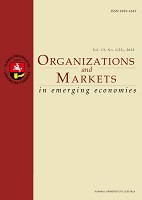Non-Linear Effect of Government Debt on Public Expenditure in Nigeria: Insight from Bootstrap ARDL Procedure
Non-Linear Effect of Government Debt on Public Expenditure in Nigeria: Insight from Bootstrap ARDL Procedure
Author(s): Nurudeen Abu, Joseph David, Awadh Ahmed Mohammed Gamal, Ben ObiSubject(s): National Economy, Business Economy / Management, Political economy, Financial Markets, Socio-Economic Research
Published by: Vilniaus Universiteto Leidykla
Keywords: public expenditure; public debt; bootstrap ARDL; dynamic ARDL simulations; Nigeria;
Summary/Abstract: This study employs the bootstrap autoregressive distributed lag (ARDL) approach alongside the dynamic ARDL simulations technique to investigate the non-linear effect of public debt on public expenditure in Nigeria during the 1981–2020 period. The result of the bootstrap bounds test illustrates the presence of a long-term relationship between public expenditure and public debt (along with oil rents, output growth and urbanisation). Further, the estimation results indicate that the effect of public debt on public expenditure is non-linear. In particular, public expenditure increases at early stages of rising public debt but declines at latter phases when public debt grows beyond specific threshold. This empirical outcome is further validated by the dynamic ARDL simulations approach which shows a significant decline in predicted public expenditure after short-term expansion due to counterfactual shock in public debt. Thus, policies which diversify public revenue from oil production and a reversal of the rising trend in public debt are recommended to avert the adverse welfare implications of declining public expenditure.
Journal: Organizations and Markets in Emerging Economies
- Issue Year: 13/2022
- Issue No: 1
- Page Range: 163-182
- Page Count: 20
- Language: English

